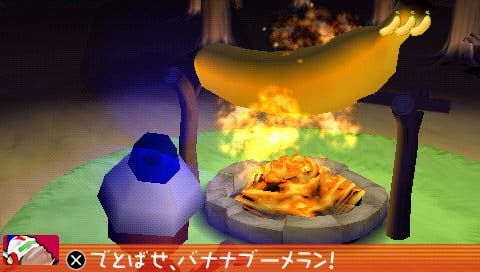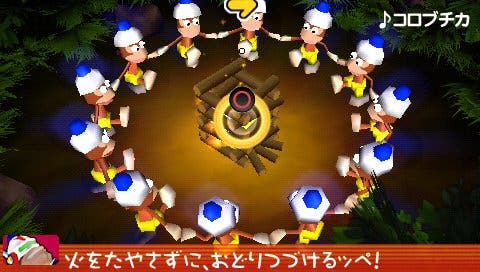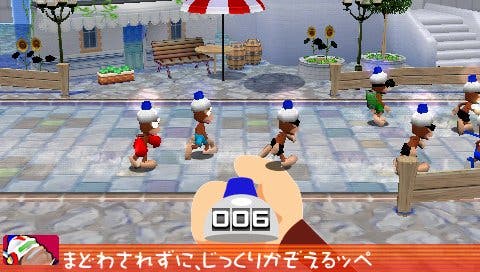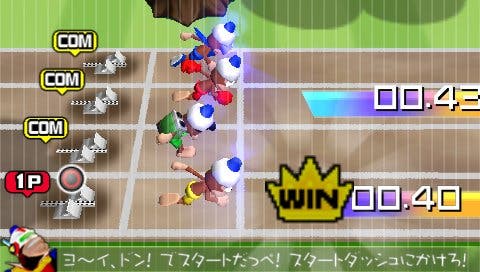Ape Academy
Worth monkeying around with? Or just plain monked up? Let us school you.

They may not have escaped with enough gusto to avoid capture in every game they've featured in, but Sony's mischievous monkeys have certainly escaped generic classification over the past year or so, following up an enjoyable PS2 platform romp with an EyeToy title before popping up for a cameo in Metal Gear Solid 3, of all games, and now springing up in this - the first of what we reckon will be a good few mini-games packages for the PlayStation Portable.
Whether it's the first good mini-games package for the PSP is another matter entirely. Although we're loath to rate it at this point due to the difficulties we've had with the language barrier (those people who insisted it wouldn't be a hindrance presumably didn't mind automatically losing every time it fell back on a text-based quiz mini-game), there are rather too many "hrms" based on a few hours play - even if they're frequently offset by the joy of swinging from ropes, deflecting a hail of arrows with a shield, counting monkeys in a procession and playing a bizarre shoot-'em-up version of paper-scissors-rock.
Ape Academy - or "Piposaru Academia!" as the title screen chirpily reminds us - lets the player choose a name and a particular monkey and then pits him or her against a plethora of mini-games split over a series of "school terms" at the eponymous academy. The idea is that each "term" has a particular teacher and a series of nine mini-games to complete arranged on a grid. By completing a randomly selected mini-game successfully you get a blue circle. Lose and it's a red cross. You open up the next term - and perhaps even some other bits and pieces - by getting as many horizontal, vertical or diagonal lines of circles as possible, noughts and crosses-style. (A quick side-note to our American readers here: "noughts and crosses" is the same thing as "tic-tac-toe", just with an unrubbish name.)

Each mini-game is trailed by a screen listing the controls (although it's in Japanese, it does at least give you an idea of which buttons you'll be using, even if you can't immediately figure out what they're for) and can last anything from a few seconds to a couple of minutes, often with various rounds within the same game. This is no quick-fire Wario Ware clone, for sure. (Indeed - after a while with Ape Academy the concept of it being "quick-fire" would be laughable if it wasn't so depressing, but that's a matter to address in a few paragraphs' time.) And each mini-game is likely to recur in increasingly complex and troublesome variants in latter terms.
Beyond that, every mini-game you win is unlocked for single-round play in another area of the game, there are a number of multiplayer options that rely both on wireless connectivity and a friendly huddle round a single PSP, and there are certain bonuses for managing to get a grid completely covered with blue circles, amongst other things.
But, as with virtually every equivalent package on the Nintendo DS - which seems to be more or less designed for this sort of mini-game package - it's the quality, longevity and quantity of the tasks themselves that will make or break the package. And at the moment there's as much making as breaking.

Some of the games are genius. Really infectiously smiley stuff. Even the simplest ones. Sitting there with a clicker counting monkeys running past might sound stupidly basic, but it's surprisingly fun as monkeys get to the end then double back to try and confuse you and rush past in ever-increasing numbers. Using the D-pad to rotate a shield around your monkey as arrows rain down so they bounce off is nervy and requires quick wits. Likewise using a sword to try and catch the right combination of falling objects - balls, slices of cheese, nuts and so forth - in the right order. And catching bombs on platters before passing them off to monkeys on either side of you. In terms of the more involved efforts, trying to get a pillar of teetering monkeys to stay upright the whole way along a left-to-right course can be gruelling and rewarding, as can trying to navigate a series of swinging vines to reach the end goal. Even the basic rhythm-action stuff is as comfortable and engaging as timed-button-pressing games usually turn out to be.
But some aren't quite as clever as they should be. Rotating round a spit-roasting banana using the D-pad and firing at encroaching monkeys is a bit tedious, playing matador to charging bulls is a bit on the fiddly side (and probably suffers in comparison to DS title Feel the Magic/Project Rub's "click the charging bulls as quickly as possible!" alternative), and some of the better ideas are upset by control issues. The air hockey idea, for example, should be brilliant, but the digital movement isn't precise enough and the analogue nub is mysteriously unhelpful.
To be fair, there are plenty of mini-games in here and we definitely haven't seen them all yet, but for the moment it feels like a noble effort upset by inconsistency. And the ridiculous load times, which is what we were alluding to earlier, as well as some odd menu behaviour, don't help matters. Quite why you can't exit a particular term once you've entered it without resetting the game to the PSP's Home menu and reloading remains a mystery. And the load times rapidly become frustrating, particularly if you fail a task more or less immediately after starting it, and give the game the feel of preview code in need of optimisation.

This may be partly down to the graphical approach. The game tries to look as much like its PS2 forebears as possible by adopting a polygonal approach, but in the end it still looks quite basic and the decision to use three dimensions smacks of trying to scale the game to the technology rather than just trying to make something that's purely fun. We can't help wondering if Ape Academy would have been quicker to load and looked a bit tastier with some nicely drawn and stylised 2D sprites to match the colourful main menu design instead.
It's certainly fun for the most part though, and the multiplayer aspect is promising. Although we can't test the wireless play with our one single Ape Academy UMD (unless anybody fancies buying us another one?), the multiplayer-on-one-PSP works very nicely indeed, with at least ten of the mini-games supporting it. These include the surprisingly enjoyable "one metre sprint", which involves getting ready, getting set, then waiting for the starter's pistol with finger poised on the button. The idea is that each player gets a button, and the quickest to react to the pistol wins. A bit like the way we used to waste Physics lessons trying to start and pause a stopwatch as close to 0:00:00 as possible.
The papers-scissors-rock game, meanwhile, is something we're happy to eulogise. Two monkeys line up opposite each other on a star-screen with beat-'em-up-style health bars above their heads and move repeatedly up and down the screen. The player can shoot out paper, scissors and rock symbols, and if they strike the other player then it saps their health. However, the other player can counter by sending out the appropriate response - rock for scissors, paper for rock, et cetera - to return the blow. As the timer ticks down, the monkeys move closer and faster.
It's just a shame there isn't more of that, because for all its good ideas Ape Academy feels too sluggish and inconsistent to be truly recommendable at this point. It's fun, and we're happy to sit and play it, but we still hope it'll be sharpened up a bit for its appearance in the West, or our preview diplomacy may well escape us completely.

